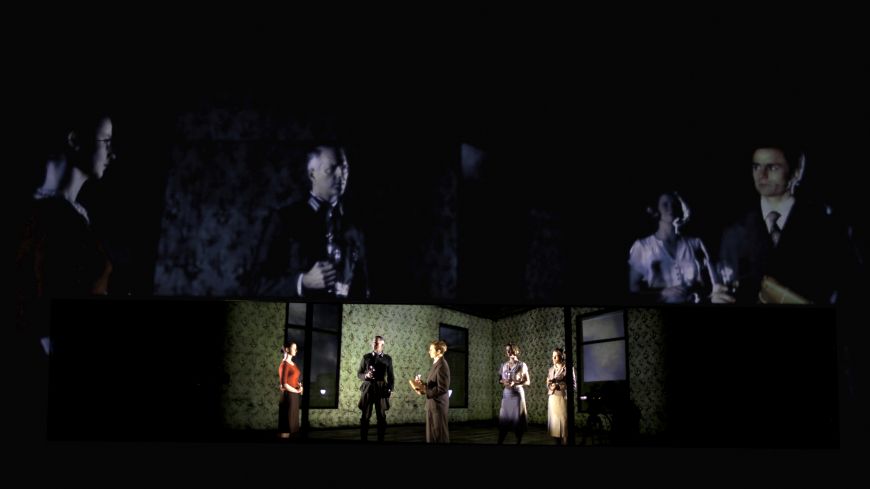
An impressive visual mix of old and new.
Set in Berlin during the final days of World War II, this blend of the theatrical and the cinematic looks at the intertwined personal lives of men and women from England, Germany and Russia. Imitating the Dog regard the piece as the final part of The Harry Kellerman trilogy, the first two being Hotel Methuselah and Kellerman, produced in 2006 and 2008 respectively. The show is performed in English, German, Chinese, and Russian with English subtitles and is part of the British Council’s Edinburgh Showcase.
This technically impressive production is a juxtaposition of old filmic methods married to modern video techniques. There is an immediate sense of cinema as soon as the lights dim before this unusual show.
A large screen with gridlines sets the tone. These grid lines blur to a sky of starlings over the piece. Three smaller black screens below open and close like camera shutters splitting the triple space that is used as a theatre stage. These become the set of live action that is filmed as it is being watched, its large movie projection being just out of sync on the screen above.
Between takes, baseball capped silhouettes shout the live direction and operate their cameras whose lights shine back at the audience like the eyes of mechanical cats. Between the live film shooting, the face of a (presumably) Chinese man narrates a tale of a train as a bizarre metaphor for life.
The slow steady march that was the accompanying music from Jeremy Peyton Jones is highly atmospheric, adding to the cinematic allusion and Heather Bagley’s costume design is immaculate. Adam Nash, looking like a stand-in for Trevor Howard in Brief Encounter, has the perfect English accent, pronouncing the German name ‘Gunter’ like the English word ‘Bunter’, yet anachronistically using the recent American pronunciation of ‘bin’ for the word ‘been’. Annoyingly, apostrophes are missed from the subtitles.
The old tricks of outdoor and car scenes being filmed in studio as part of the drama of the stilted old war time movie are used but the Chinese word for ‘cut’ was heard just too many times and adds nothing after the first few ‘takes’.
Over and above, some scenes were repeated adding no momentum to the already confusing narrative or narratives in this long show with too many similar looking strands for each to stand out as separate texts
It is only towards the end that play’s possible metaphor becomes clearer. A Sputnik has been sent to the future by the Russians and reports back that all hope is gone and there is nothing left. Is this a comment on the fall of communism? Are the Chinese director and the dominant Chinese narrator a vision of where power will lie in the real future? Is personal human interaction love and more important than the big political picture? Either way, the technical wizardry of this show befuddles any message rather than illuminating it.
Show times
20-24 Aug, 12pm
TIckets
£12 (£10)
Suitability 14+

